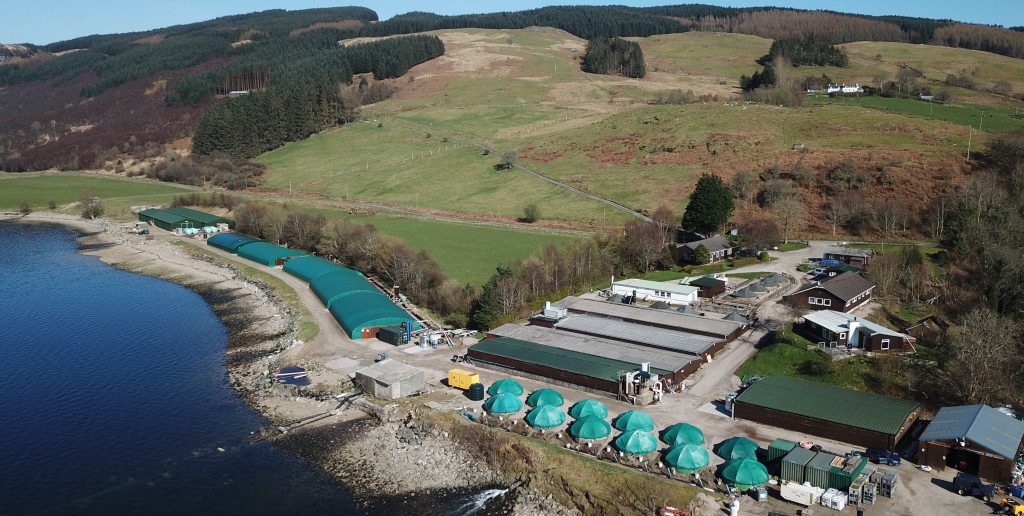
Features
Breeding
Strong breeding base for new multi-species trials facility in Scotland
June 1, 2021 By Colin Ley
 Otter Ferry Seafish site (Photo: Otter Ferry Seafish)
Otter Ferry Seafish site (Photo: Otter Ferry Seafish) A £300,000 (US$425,000) multispecies research and development facility is due for completion in Scotland this summer in an industry-led move to create “much-needed” marine aquaculture trials capacity.
The new facility will be located at Otter Ferry in Argyll, home of Otter Ferry Seafish, one of the U.K.’s longest established aquaculture businesses, with production records dating back to 1967. Working in conjunction with the U.K. Government and industry-backed Agri-EPI Centre, Otter Ferry Seafish is committing land and cash to the new venture on a co-funding basis with Innovate UK, a non-departmental public body which ‘operates at arm’s length’ from the U.K. Government as part of the country’s research and innovation structure.
The almost-ready facility is designed to undertake a wide range of studies, such as evaluating feeds and pharmaceuticals, instrumentation testing, and the validation of operational welfare indicators. The finished unit with have six 20m3 and twelve 2m3 aquaculture rearing tanks, all equipped with programmable lighting, automatic feeding, and oxygen & pH monitoring systems.
All tanks will be supplied with filtered, UV-disinfected seawater, with waste feed collectors fitted to the outflows. The facility will be is suitable for rearing diverse species including fin fish and non-fin fish such as cleaner fish, microalgae, shellfish & seaweed.
Commercial host
Although much of the new unit’s focus will be centred on the on-growing of selected species, the development’s commercial host give the facility strong hatchery links, according to Alastair Barge, managing director of Otter Ferry Seafish.
“We recently completed a £1.5 million (US$2.12 million) nursery expansion for our wrasse business, adding that to our separate hatchery facilities for wrasse, halibut and lumpfish,” Barge tells Hatchery International. “As such, we see the new trials facility as being very much complementary to our own existing research and development involvement in relation to breeding requirements.”
Initially set-up as a land-based salmon farming operation, the Otter Ferry business responded to rising market demands for cleaner fish by diversifying into its current species, creating an extensive operation which currently produces 100,000 juvenile halibut, 300,000 wrasse and 800,000 lumpfish.
“We felt that our site and farming experience lent itself to cleaner fish development, always on a market-led basis and with a strong commitment to trails and development,” said Barge. “Our first trials partnership, for example, began back in 1981 when we undertook a series of salmon feed assessments for BP Nutrition.”
The company’s involvement with Agri-EPI is also designed to be market-led and demand-driven, building on the long-standing R&D status of the University of Stirling’s Institute of Aquaculture, and the University of Edinburgh’s Roslin Institute.
“Our new facility is much-needed in the sense that it will move marine species research forward a stage, creating a slightly more commercial trials approach than has been possible in the past,” said Barge. “It will bridge the gap between the very good lab-based trials which are being done at present and the more extensive work that will be possible as our trials move more towards harvest size fish.”
Agri-EPI track record
The Otter Ferry development is also an important step for Agri-EPI in terms of its involvement with aquaculture. One of four UK Agri-Tech Centres of Agricultural Innovation, created through a collaboration between Government, academia and industry, Agri-EPI already has a strong track record in relation to aquaculture. This includes working with a number of commercial partners on the development of SeaCAP 6000, an open water engineering solution which is ‘set to revolutionise the protection, health and environmental impact of farmed salmon, whilst boosting the industries long-term productivity and profits’.
Agri-EPI is also working with the Scottish fish vaccination company, Aqualife, on the development of a ‘transformational’ fish vaccinating robot, which is due to be launched by the end of this year.
“We’ve been involved in many trials over the years, both as private developments run within our own business and in a broader industry-led collaboration with different partners, and we certainly welcome Agri-EPI as a positive R&D force for aquaculture,” said Barge. “They are committed to innovation, sustainably boosting productivity, reducing emissions, and increasing profitability across the whole agri-food chain, and we’re delighted to be working with them in relation to the development of our own sector.”
Sustainability
With Scotland due to be hosting the 26th UN Climate Change Conference of the Parties (COP26) in November this year, the sustainability and environmental challenges surrounding fish farming is bound to be high profile, not least with so many international journalists ‘visiting’ the country.
“We’re always seeking to innovate as a business and to do so in as sustainable a manner as possible,” says Barge. “Any development or trial projects we undertake, including the current venture with Agri-EPI, must fit this overall ethos. Anything we can do which can help our industry improve is therefore welcome and valuable. In that context, we’re confident that the new trials facility will be a major addition for aquaculture in Scotland, and beyond, and a positive contributor to our sector’s future sustainability.”
Print this page





